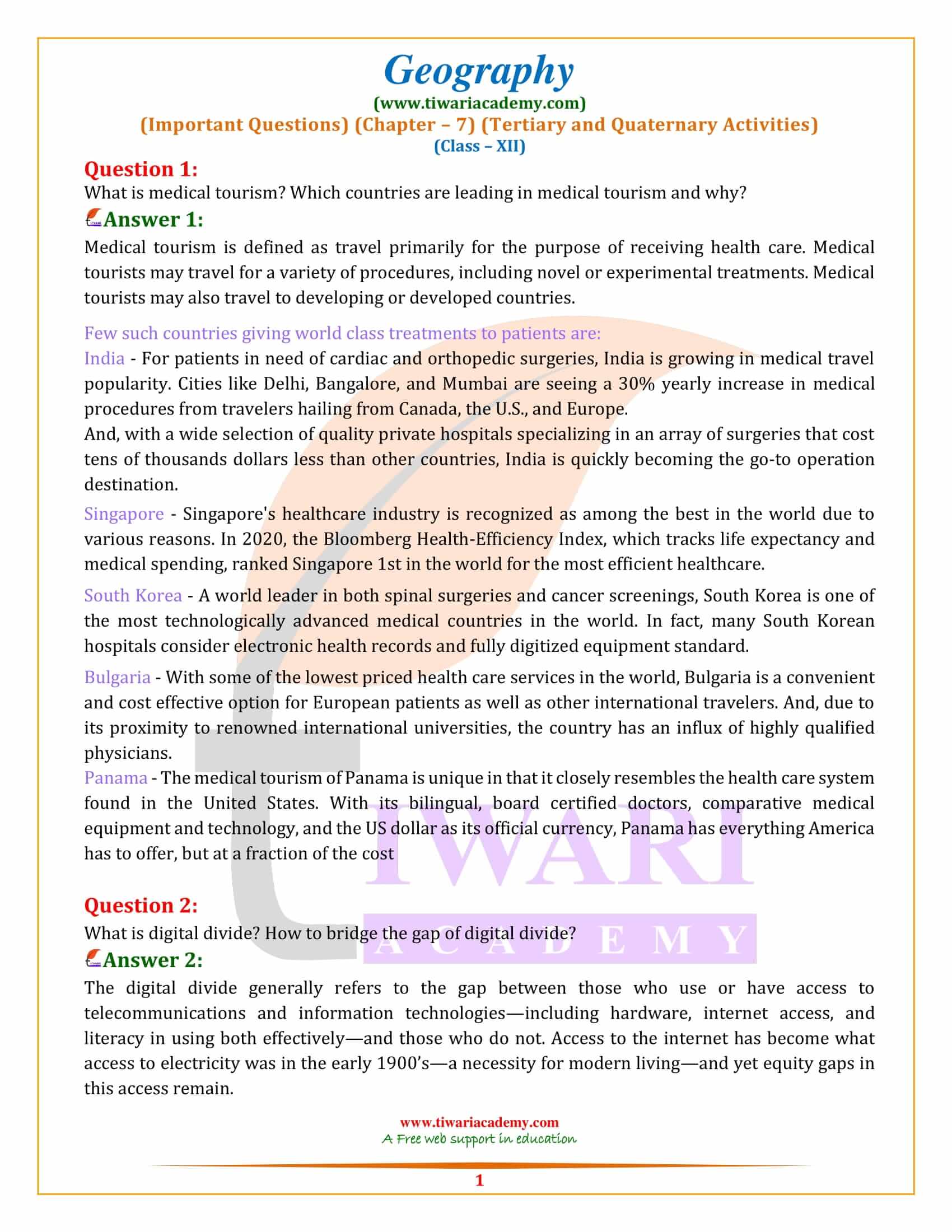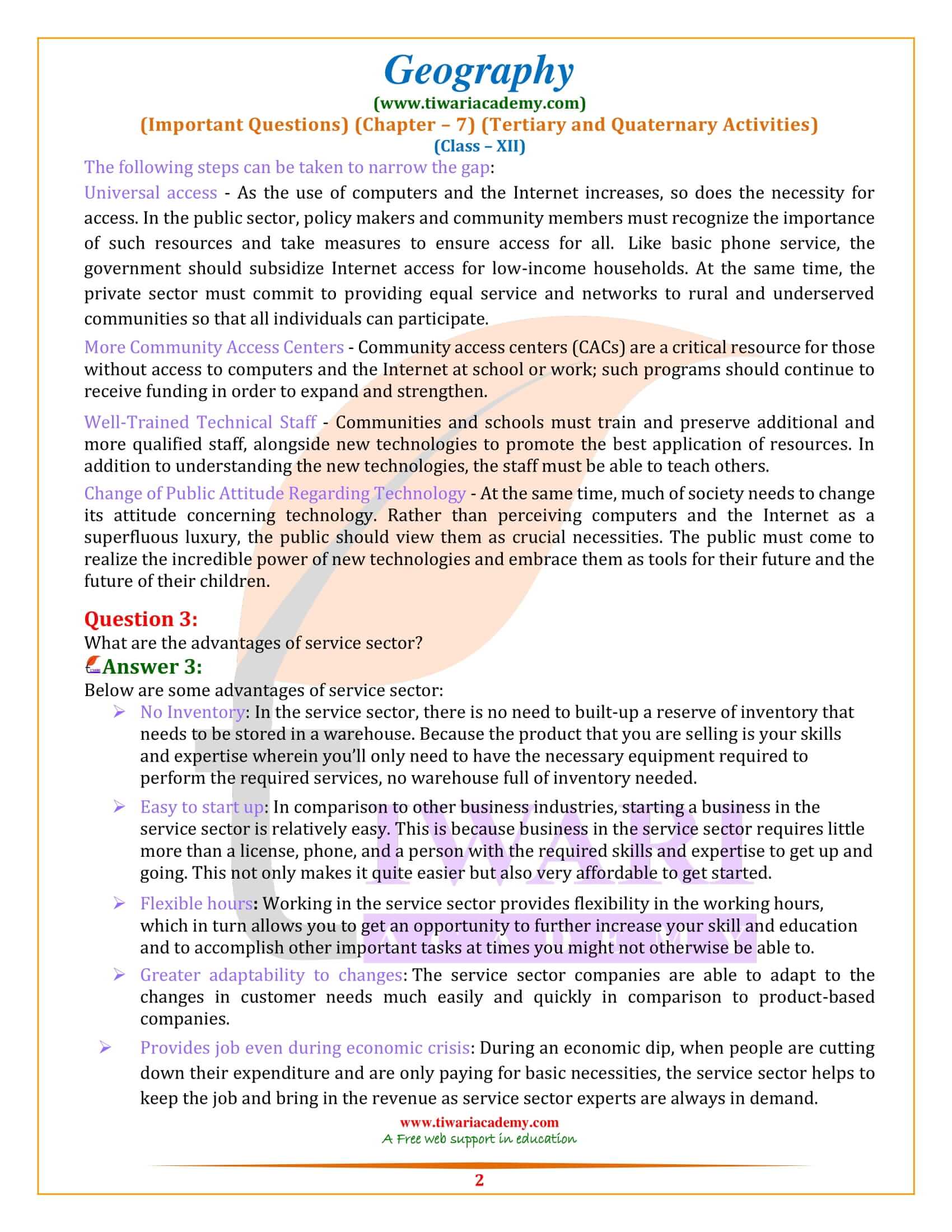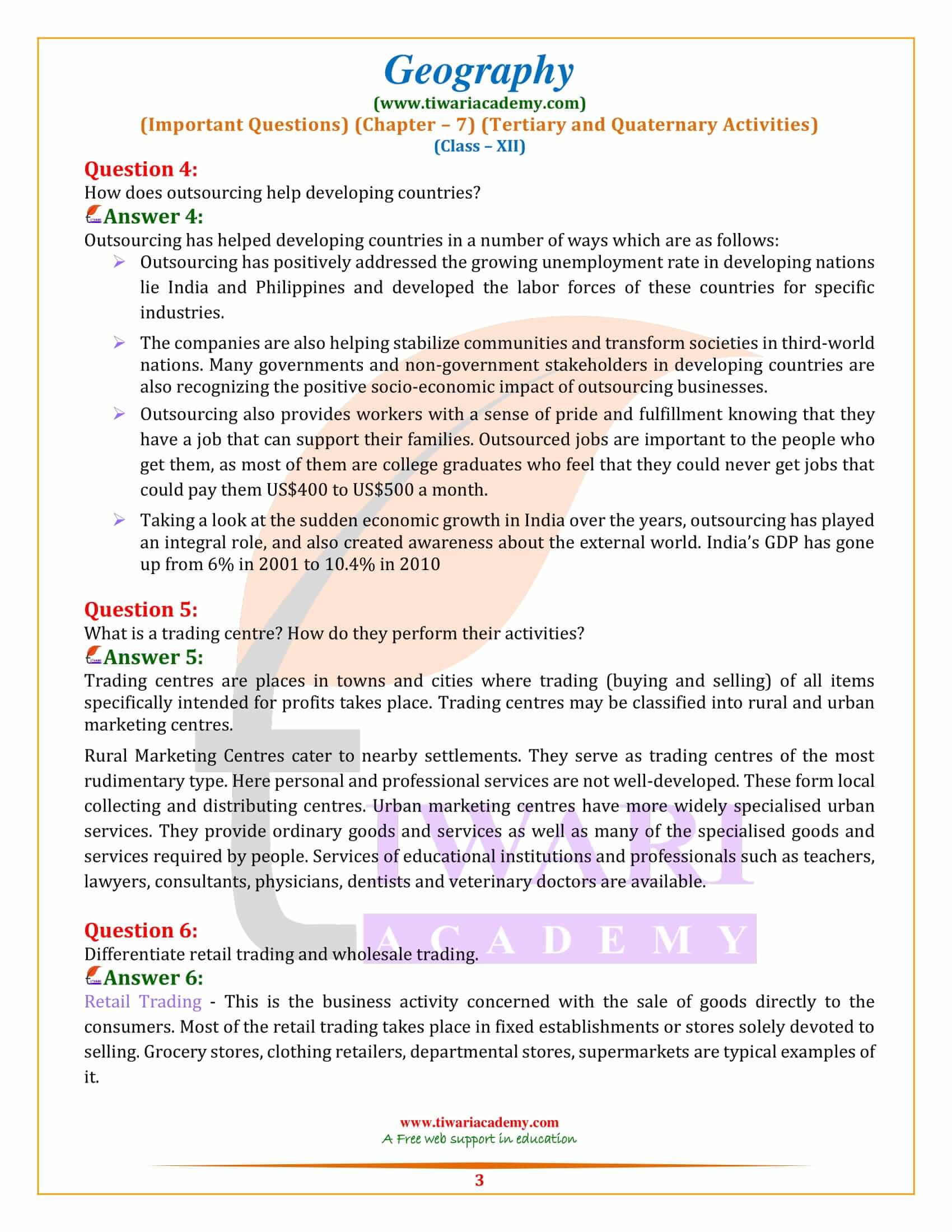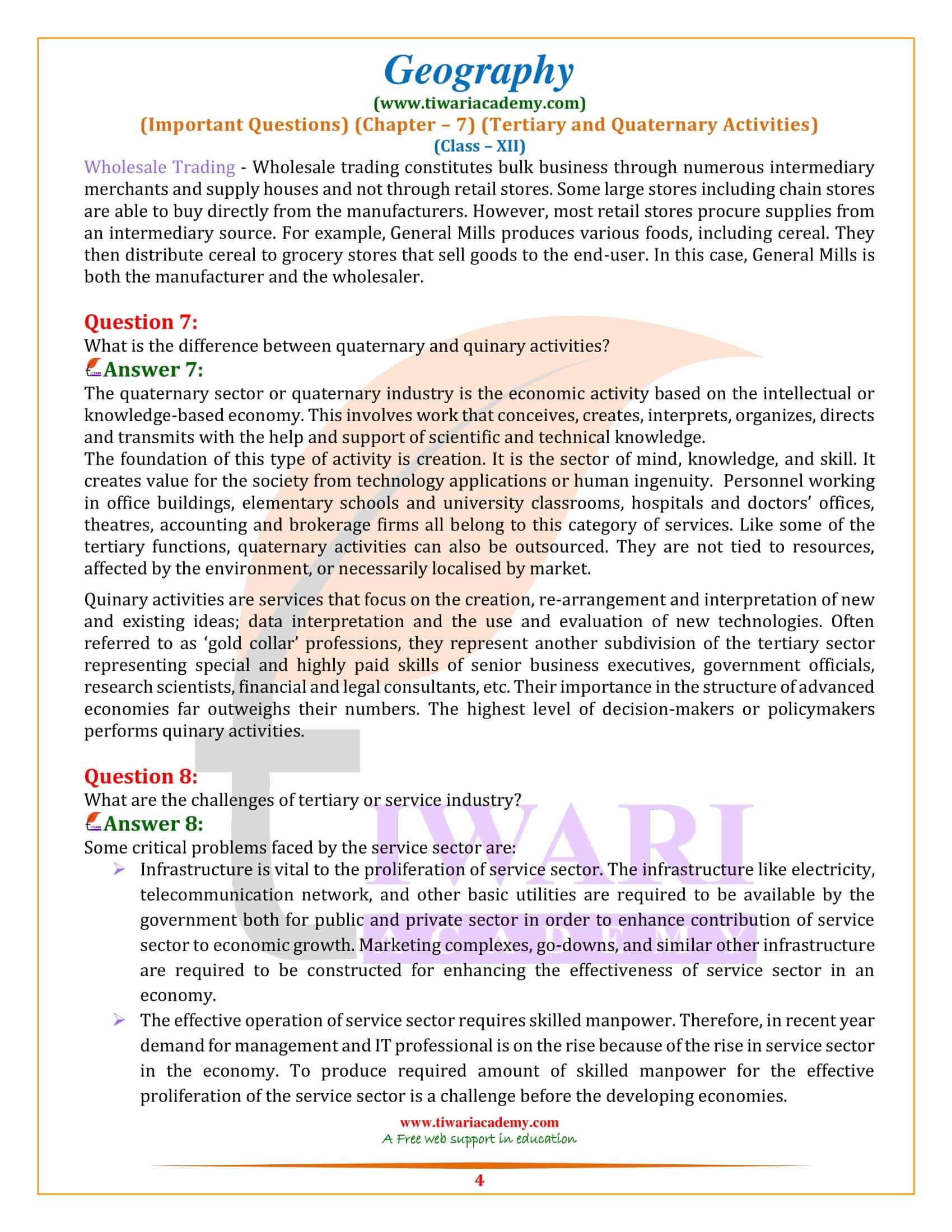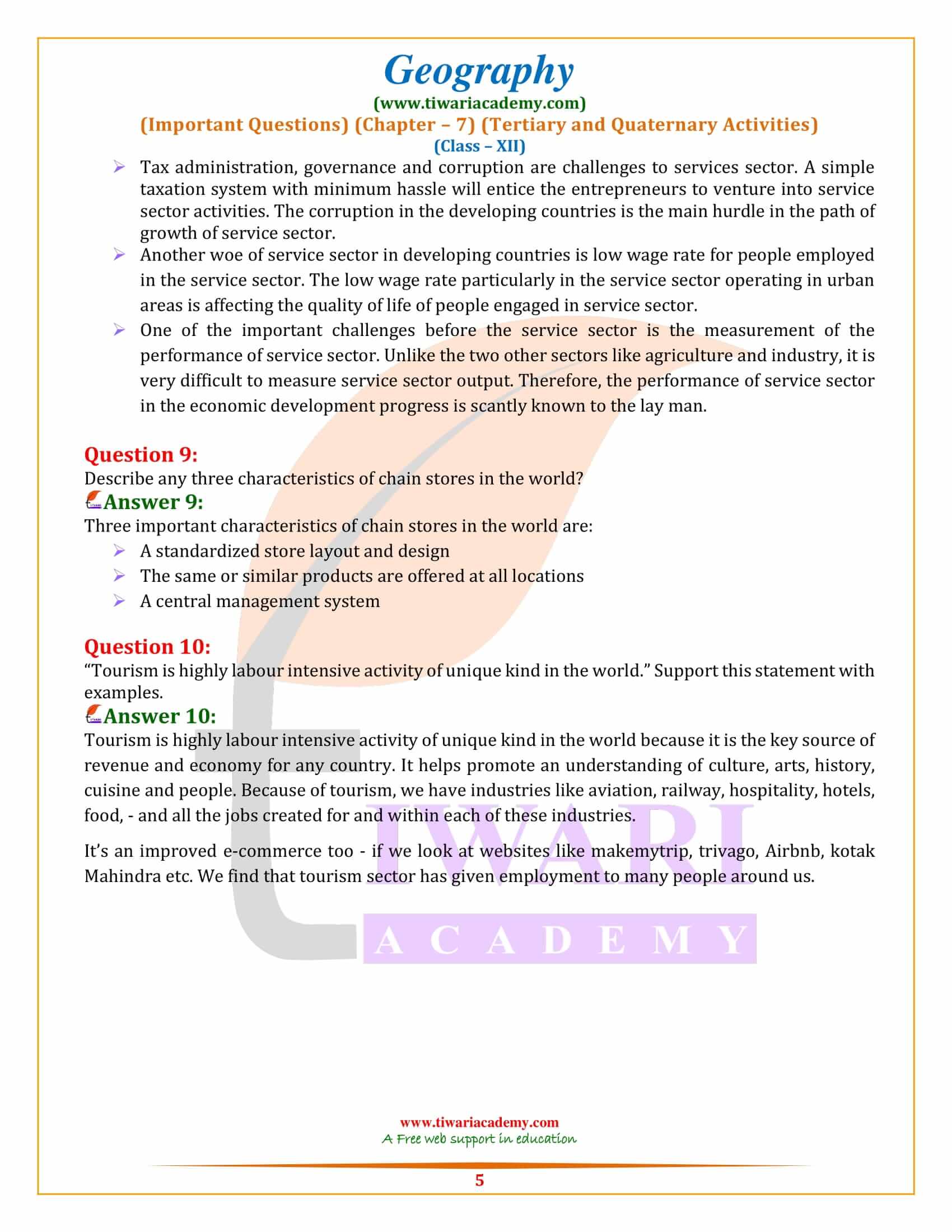NCERT Solutions for Class 12 Geography Chapter 7 Important Questions of Tertiary and Quaternary Activities updated for CBSE session 2025-26. Practice with extra question answers to prepare chapter 7 of class 12 Geography Fundamentals of Human Geography during the board exams.
Class 12 Geography Chapter 7 Important Questions
Class 12 Geography Chapter 7 Important Extra Question Answers
What is medical tourism? Which countries are leading in medical tourism and why?
Medical tourism is defined as travel primarily for the purpose of receiving health care. Medical tourists may travel for a variety of procedures, including novel or experimental treatments. Medical tourists may also travel to developing or developed countries.
Few such countries giving world class treatments to patients are:
India – For patients in need of cardiac and orthopedic surgeries, India is growing in medical travel popularity. Cities like Delhi, Bangalore, and Mumbai are seeing a 30% yearly increase in medical procedures from travelers hailing from Canada, the U.S., and Europe.
And, with a wide selection of quality private hospitals specializing in an array of surgeries that cost tens of thousands dollars less than other countries, India is quickly becoming the go-to operation destination.
Singapore – Singapore’s healthcare industry is recognized as among the best in the world due to various reasons. In 2020, the Bloomberg Health-Efficiency Index, which tracks life expectancy and medical spending, ranked Singapore 1st in the world for the most efficient healthcare.
South Korea – A world leader in both spinal surgeries and cancer screenings, South Korea is one of the most technologically advanced medical countries in the world. In fact, many South Korean hospitals consider electronic health records and fully digitized equipment standard.
Bulgaria – With some of the lowest priced health care services in the world, Bulgaria is a convenient and cost effective option for European patients as well as other international travelers. And, due to its proximity to renowned international universities, the country has an influx of highly qualified physicians.
Panama – The medical tourism of Panama is unique in that it closely resembles the health care system found in the United States. With its bilingual, board certified doctors, comparative medical equipment and technology, and the US dollar as its official currency, Panama has everything America has to offer, but at a fraction of the cost
What are the advantages of service sector?
Below are some advantages of service sector:
No Inventory: In the service sector, there is no need to built-up a reserve of inventory that needs to be stored in a warehouse. Because the product that you are selling is your skills and expertise wherein you’ll only need to have the necessary equipment required to perform the required services, no warehouse full of inventory needed.
Easy to start up: In comparison to other business industries, starting a business in the service sector is relatively easy. This is because business in the service sector requires little more than a license, phone, and a person with the required skills and expertise to get up and going. This not only makes it quite easier but also very affordable to get started.
Flexible hours: Working in the service sector provides flexibility in the working hours, which in turn allows you to get an opportunity to further increase your skill and education and to accomplish other important tasks at times you might not otherwise be able to.
Greater adaptability to changes: The service sector companies are able to adapt to the changes in customer needs much easily and quickly in comparison to product-based companies.
Provides job even during economic crisis: During an economic dip, when people are cutting down their expenditure and are only paying for basic necessities, the service sector helps to keep the job and bring in the revenue as service sector experts are always in demand.
What is a trading centre? How do they perform their activities?
Trading centres are places in towns and cities where trading (buying and selling) of all items specifically intended for profits takes place. Trading centres may be classified into rural and urban marketing centres.
Rural Marketing Centres cater to nearby settlements. They serve as trading centres of the most rudimentary type. Here personal and professional services are not well-developed. These form local collecting and distributing centres. Urban marketing centres have more widely specialised urban services. They provide ordinary goods and services as well as many of the specialised goods and services required by people. Services of educational institutions and professionals such as teachers, lawyers, consultants, physicians, dentists and veterinary doctors are available.
Differentiate retail trading and wholesale trading.
Retail Trading
This is the business activity concerned with the sale of goods directly to the consumers. Most of the retail trading takes place in fixed establishments or stores solely devoted to selling. Grocery stores, clothing retailers, departmental stores, supermarkets are typical examples of it.
Wholesale Trading
Wholesale trading constitutes bulk business through numerous intermediary merchants and supply houses and not through retail stores. Some large stores including chain stores are able to buy directly from the manufacturers. However, most retail stores procure supplies from an intermediary source. For example, General Mills produces various foods, including cereal. They then distribute cereal to grocery stores that sell goods to the end-user. In this case, General Mills is both the manufacturer and the wholesaler.
What is the difference between quaternary and quinary activities?
The quaternary sector or quaternary industry is the economic activity based on the intellectual or knowledge-based economy. This involves work that conceives, creates, interprets, organizes, directs and transmits with the help and support of scientific and technical knowledge.
The foundation of this type of activity is creation. It is the sector of mind, knowledge, and skill. It creates value for the society from technology applications or human ingenuity. Personnel working in office buildings, elementary schools and university classrooms, hospitals and doctors’ offices, theatres, accounting and brokerage firms all belong to this category of services. Like some of the tertiary functions, quaternary activities can also be outsourced. They are not tied to resources, affected by the environment, or necessarily localised by market.
Quinary activities are services that focus on the creation, re-arrangement and interpretation of new and existing ideas; data interpretation and the use and evaluation of new technologies. Often referred to as ‘gold collar’ professions, they represent another subdivision of the tertiary sector representing special and highly paid skills of senior business executives, government officials, research scientists, financial and legal consultants, etc. Their importance in the structure of advanced economies far outweighs their numbers. The highest level of decision-makers or policymakers performs quinary activities.
